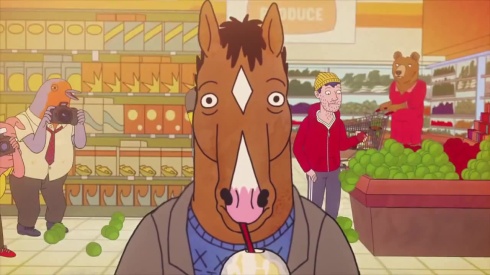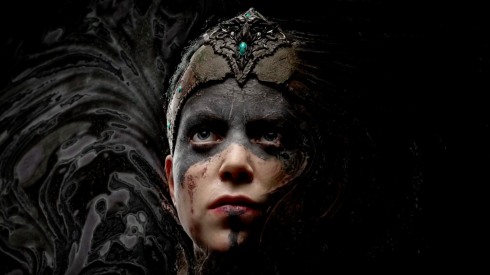
Netflix as a whole is a party I have been very late to. I only signed up late last year, and I only did so because my girlfriend really wanted to watch season 2 of 13 Reasons Why… a feat she did not finish, but I found myself sticking to the service and have been catching up on far too many shows that I should’ve seen long ago. One such show is BoJack Horseman. This is a show I should’ve watched long ago for one simple fact: it’s a stunningly accurate portrayal of mental health and the issues associated with it.
As someone who has suffered from some mental health issues for most of my teenage and then the entirety of my adult life, I found this particular show to resonate with me in a way that very few shows actually do. I even binged through the entire show, which is five seasons long at time of writing, in about four days. The show is depressing, the comedy is often dark, many of the characters are in some way unlikable yet weirdly likeable and the animation isn’t exactly going to be winning awards. It’s a strange mix of things, yet it all somehow works.
The characters are phenomenal. The titular BoJack Horseman, an anthropomorphised horse, who used to be a nineties sitcom actor and now struggles with personal issues, is a nuanced, three-dimensional character. He shatters the myth of wealth; he has enough money to do whatever he likes and he spends that money getting drunk and high every single day so he can numb himself to loneliness and depression. It’s a miserable take on things because he has everything he could possibly want and yet none of it manages to bring him any happiness. He is fundamentally broken and it can often be horrible to see some of the things he does. He makes constant mistakes, beats himself up over everything and ultimately makes everything worse for himself. He is, by and large, an asshole.
The show explores why this is the case. His childhood and his success contribute to the misery in his life. Yet despite that, the show tries to show us the good in him. It tries to show us that he wants to change but doesn’t know how. He’s broken, and he’s afraid of being fixed. Because what happens when he’s fixed? What happens if he fixes himself and nothing is changed? What happens when he sobers up and changes his outlook on life? What happens if the misery remains? It’s a feeling that I’ve had to deal with in my own life, and it isn’t an uncommon feeling either. It’s the same kind of thinking that leads us to believe that we are actually not broken, this is just who we are, and so there’s no point in trying to fix ourselves through therapy or anything else because when that inevitably fails then we’ll know for certain that we were the real problem all along.
That is what BoJack Horseman tells us. It understands those kinds of feelings, but it does not condone them. BoJack is often told to seek help, but he never does so. In fact, the first time he makes an actual positive change is, and this is a mild spoiler, in the last scene of season five. So we don’t even know whether there will be any positive change in him because season 6 hasn’t been released yet.
BoJack grapples with issues that his friends also deal with, because the show is not only about him even if he is the titular character. His friends include a writer who’s struggling with her personal identity and coming to grips with what she wants to do with her life, a man-child character who has no plans in life but isn’t particularly phased by it, an agent who’s staring down middle-age and has to struggle with juggling a career and the desire to start a family, and even a happy-go-lucky fellow nineties sitcom actor who clearly has issues with emotions and understanding the wants and needs of other people.
These characters struggle with depression, loneliness, self-loathing, self-pity, self-destructive behaviour, addiction, their sexualities and their childhoods. The show understands that people have neuroses. People who seem normal when you meet them have issues when you start to dig a little deeper. At the beginning of the show, we know that BoJack has issues. We know it because those issues are front and centre. Then as the show unfolds we start to learn more and more about the other characters, and their problems start to become more fleshed out and explained. Every one of these characters gets screen time to explain their personal lives, and the cast is a robust, well-rounded selection of characters.
Even smaller characters (a bit of a spoiler here), like a late love interest for Mr. PeanutButter (because yes, those are the kinds of names you’ll find in this show) who first seems to be a ditsy, young girl. But as she continues to date this older man we get to see that she’s worried about the relationship; she wants to be perfect for her new boyfriend and she feels the pressure growing as Mr. PeanutButter continuously and selfishly brings up the faults of his exes. She knows their faults and struggles with plugging up her own faults because she wants to make this man happy. Mental health does not only mean depression, it means mental health in everyday life.
Our mental health can be affected by everything, and that includes relationships. Even when relationships are going well they can cause a massive amount of stress because there is so much pressure for a relationship to last long. The pressure is on us at all times to be happy, to be perfect, to be undamaged, but that will not necessarily happen. BoJack Horseman may be a show about rich Hollywood types, but the struggles of an anthropomorphised horse and dog, an asexual man-child and strong, independent women can be applied to so many people. This show is relatable to someone like me on so many levels, and it has clearly resonated with many more people than just me.
The show is also well-made, well-written and well-paced. It’s a well-produced piece of entertainment, and delivering something this heartfelt through an entertaining medium is the kind of work that deserves to be praised and held on high. This show might just teach people a thing or two about their own mental issues. It will be confrontational, and it will be rude, but that’s also the nature of the world. Sadly, we can’t escape many of these things and so I elect to face them head-on. Bring me your unhappiness and your depression. Bring them front and centre so I can see them and understand them. I can’t sympathise with what I cannot see, and BoJack Horseman shows it all. It’s an uncompromising show rife with unhappiness, but there’s something comforting about that. If someone was able to write something that resonated so strongly with someone like me then perhaps they understand what it’s like. They understand that despite our places of privilege we are allowed to be unhappy. We are allowed to feel to feelings the BoJack feels, but we should also understand that this is not the way it should be. Just because we can sympathise, does not mean it’s right. We have to try and do better.
